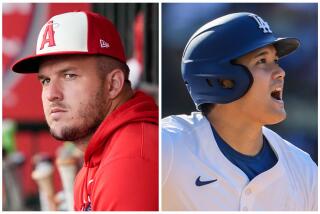Column: Too many teams have no chance of winning and that’s not good for baseball
- Share via
Bud Selig’s stump speech always included three words: hope and faith. So did his Hall of Fame induction speech last year.
Here was the former commissioner in 2000: “Every fan has to have hope and faith. If you remove hope and faith from the mind of a fan, you destroy the fabric of the sport.”
No fan, he thought, should be deprived of the spring training dream. After owners of rich teams agreed to share some of their money with owners in smaller markets, Selig believed, every fan could see pitchers and catchers report to spring training and wonder if this could be the year. The chance would be better for some teams than for others, but at least there would be a chance.
Spring training opens in two weeks, and hope and faith is dead all across America.
The Atlanta Braves have yet to sign a major league free agent, and not because they are fully stocked with championship talent. Same for the Baltimore Orioles, Miami Marlins, Pittsburgh Pirates and Tampa Bay Rays. If you’re a fan of the Chicago White Sox, Cincinnati Reds, Philadelphia Phillies, Detroit Tigers or San Diego Padres, good luck.
That’s a third of the teams in Major League Baseball that do not appear to be playing to win this year. It did not seem unreasonable to ask Rob Manfred, who succeeded Selig, what problems that might pose for the sport.
“I don’t agree with the premise of your question,” Manfred said.
League attendance last season declined for the third consecutive season, to its lowest level since 2002 and down 8.6% from the record high in 2007.
A decade ago, teams would sign a veteran stopgap or two and proclaim they would be competitive, if not contending. Now, there is no shame in losing 100 games, in the name of tanking for better draft picks and a bigger signing pool for Latin American teenagers.
“Baseball has always been a cyclical player business,” Manfred said Thursday at the owners’ meetings in Beverly Hills. “Teams have always done best when they bring a cohort of players together, and that group matures together and becomes competitive. I don’t see a conceptual change.
“More important, our fans are very sophisticated. They know that the Houston Astros won last year, and they know how they won, and what the process was that they went through in order to put themselves in a position to win. They also remember that in 2016 the Chicago Cubs won, and they also remember the process the Chicago Cubs went through to put themselves in a position to win.”
The Dodgers are playing to win, but their winter game plan has focused on their quest to avoid paying a luxury tax, not on adding talented players. That might satisfy sophisticated fans, in an era where the San Diego Padres’ A.J. Preller is not the only rock star general manager. It’s hard to see how that grows the casual fan base.
The Cubs and Astros are worthy examples, but the Cubs play in the third-largest market in the United States, and the Astros are in the top 10. Can every team add Jon Lester ($155 million for six years) or Justin Verlander ($43 million for two-plus years) when the time comes to win?
Although the Cubs won in 2016 and the Astros in 2017, the Braves and Padres and Phillies and Reds and White Sox all cannot win in 2019. The fan base was disillusioned in Pittsburgh this winter, when the Pirates traded stars Andrew McCutchen and Gerrit Cole. And that was after the Pirates’ rebuilding had paid off with three consecutive playoff appearances.
When some of these tanking teams do not even make the playoffs — prospects carry no guarantees — what happens to those fans who were told to give the team three years and it would win?
“Look, it was never possible that more than one team was going to win in any given year,” Manfred said. “I think our fans understand the time horizon associated with the process of building a winner. I actually think fans find it exciting to watch a team grow and mature. Sometimes, they grow and mature a little faster than people expect.
“I think that’s what made the Yankees such a great story last year. It’s the hope that that can happen with your team, whoever that might be, that keeps our fans engaged.”
The Yankees were a great story. But, when your role model for victory through player development is the team that just assumed the largest contract in North American sports history, you’re not truly selling hope and faith for all.
Follow Bill Shaikin on Twitter @BillShaikin
More to Read
Go beyond the scoreboard
Get the latest on L.A.'s teams in the daily Sports Report newsletter.
You may occasionally receive promotional content from the Los Angeles Times.











